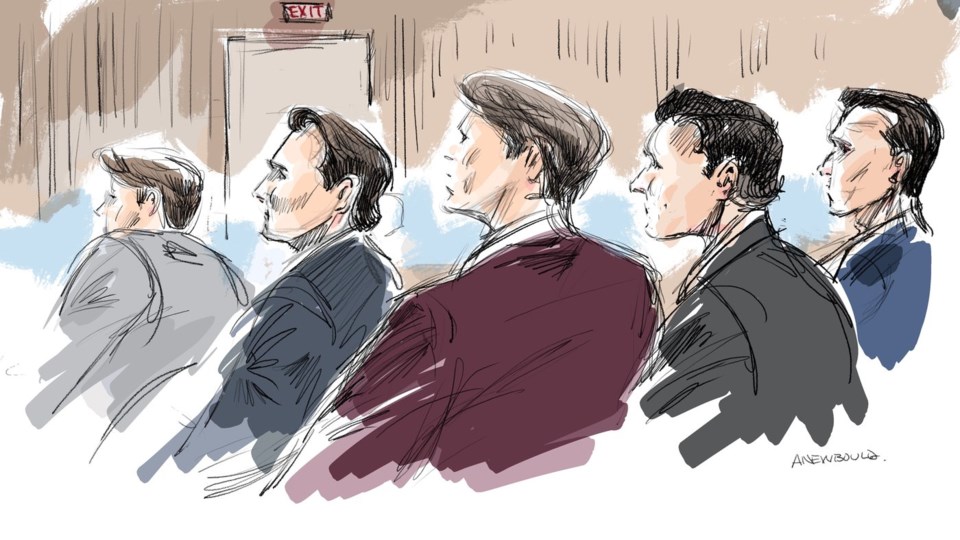TORONTO — The sexual assault trial of five former junior hockey players that culminated in their acquittal on Thursday is sparking a renewed conversation about how young people are being educated about sex and masculinity, experts say — and how parents and coaches can have a positive influence on boys.
Michael McLeod, Carter Hart, Alex Formenton, Dillon Dube and Callan Foote were found not guilty on Thursday in connection to a group encounter with a young woman in a London, Ont., hotel room in the early hours of June 19, 2018, when they were between the ages of 18 and 20.
The case centred around the issue of consent. The complainant testified that she did not consent to the sexual acts that took place in the room involving the five players, and the Crown argued that the players did not take reasonable steps to confirm that she consented.
Ontario Superior Court Justice Maria Carroccia said in her ruling Thursday that the complainant's testimony was not credible or reliable, and found there was "consent not vitiated by fear," noting the absence of physical force, violence or threats during the encounter.
During the trial, defence lawyers pointed out that the court was not tasked with assessing whether the men could have been better behaved or more respectful.
Beyond educating young men about the legalities of consent, those questions of behaving more respectfully are where other actors can step in, experts suggest.
University of Calgary professor Michael Kehler says it is common for young men to be shown narrow scripts for masculinity, especially in team sports settings where there is a focus on physical domination.
"I think that coaches and athletes themselves should be having these conversations about spaces like locker rooms, talking (about) how do you talk respectfully and how do you build a relationship," Kehler said.
"We have a responsibility to support youth to navigate these sporty spaces and to feel that they are actually able to speak up when they hear or see actions or attitudes in those spaces that are harmful to other people."
He said coaches and parents should offer young people opportunities to speak up when uncomfortable situations arise, and challenge stereotypes about how men are supposed to behave.
The trial has prompted a critical opportunity for generational change both within hockey and across the board, said Jonathon Reed, a director with Next Gen Men, a nonprofit organization that seeks to promote healthy masculinity.
"What a wonderful gift of hockey. … That's a space in which boys care about that culture and look up to those role models and they're engaged. That's special and important," he said.
"A lot of us are probably upset with Hockey Canada for some systemic stuff over the years. I don't disagree with that, but I have a lot of affinity to the everyday humans who are living and breathing hockey, and especially for those who are positioned within that culture to give boys an opportunity to really think deeply, map out who they're going to be."
The incident that led to the sexual assault charges against the players first came to the public's attention in 2022, after TSN reported that Hockey Canada had quietly settled a lawsuit filed against the sports organization and eight unnamed players for an undisclosed amount.
Court heard in the recent trial that the organization moved ahead with the settlement without the players' knowledge or agreement — something that led to national conversations around reforming sports culture, but that a lawyer for McLeod also said unfairly shaped public perception for years.
Reed said boys are highly influenced by their experience in sports, and that makes changing the culture in the hockey sphere valuable. But there is an opportunity for a broader conversation arising out of the trial, he said.
In his own experience reaching out to youth, mainly in Grades 7 to 9, Reed said he heard a range of opinions about the junior hockey players' case — from boys trying to poke holes in the prosecution's argument to others expressing full belief in the complainant.
Two short videos of the complainant that were recorded the night of the encounter, in which she said she was "OK" with what was happening and that "it was all consensual," featured heavily in the trial.
When he talks to teens about consent, Reed said he likes to give them an analogy that shows something has "gone off the rail" if they feel compelled to solicit a video like that.
"We stop at stop signs when we're driving. We also are paying attention to the construction zones and pedestrians and how your behaviour changes when you're tired or it's late at night or you're surrounded by your friends or you're intoxicated. All of that is relevant to driving safely. You would never say to somebody, 'Hey, record this video saying you consent to getting in the car with me,'" he said.
"I would want boys to think, 'How am I navigating this encounter, this experience, this relationship with some level of intuitive safety?'"
Reed said he hopes a takeaway from the case is that young people will have more empathy for everyone involved — the complainant, whose character was attacked in difficult cross-examination and questioned in the ultimate judgment, but also the acquitted players, who went through "a really challenging and scary experience."
Youth and adults alike should have empathy for boys and young men who are learning about healthy sex and relationships as such high-profile cases play out, and as some of them naturally identify with the accused, he said.
"I don't know if I can overstate the level of fear that boys and young men are feeling," said Reed.
— With files from Paola Loriggio.
This report by The Canadian Press was first published July 25, 2025.
Cassidy McMackon, The Canadian Press




